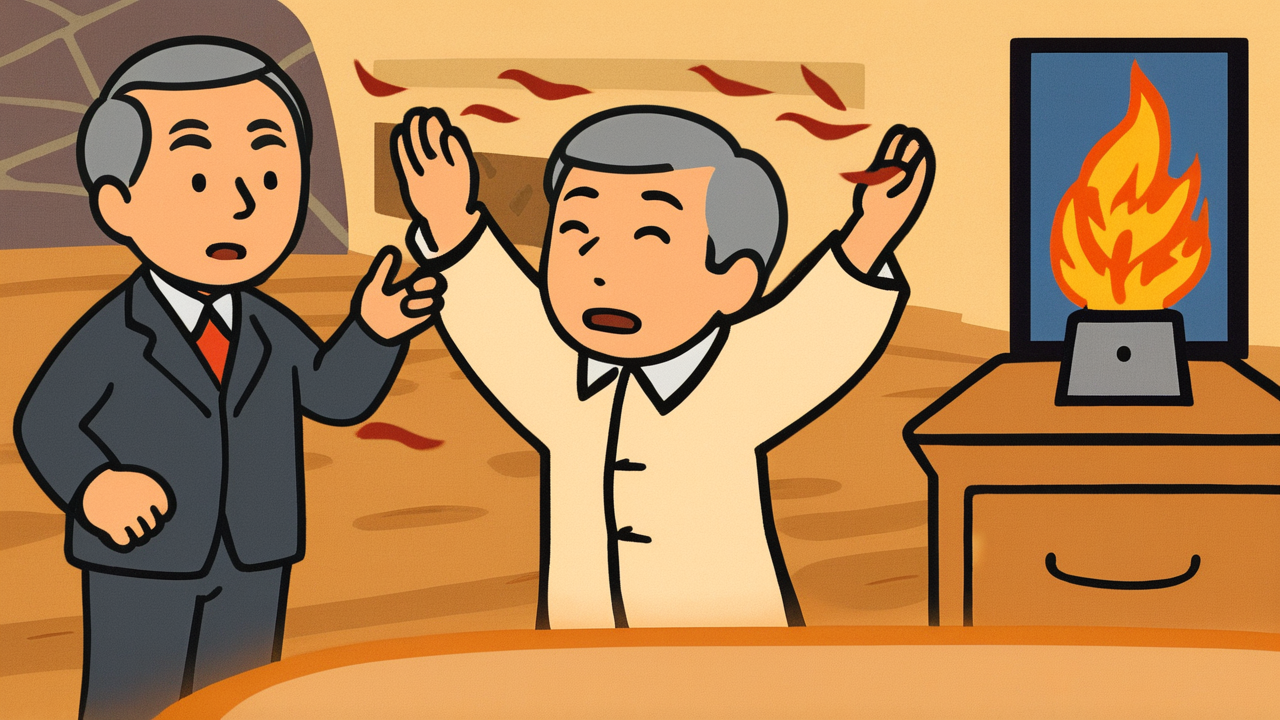How to Read “地震雷火事親父”
Jishin kaminari kaji oyaji
Meaning of “地震雷火事親父”
This proverb lists the four threats that people should fear most, arranged in order of terror.
Building collapse from earthquakes, the danger of lightning strikes from thunder, fire damage from blazes, and the anger of patriarchs with absolute power. All of these were serious fears that threatened life for people in the Edo period. Particularly in Edo, where wooden buildings were densely packed, earthquakes and fires had the potential to devastate entire districts.
This proverb is used when expressing feelings of fear or when explaining frightening things in stages. It’s often used as a standard for comparison, such as “They say ‘Earthquake thunder fire father,’ but my boss’s bad mood today is even worse than that.”
While fear of natural disasters remains unchanged today, with the decline of patriarchy, the last part about “father” has become harder to relate to. Nevertheless, it continues to be used as an expression of fundamental human fears.
Origin and Etymology
“Earthquake thunder fire father” is a proverb from the Edo period that lists frightening things in order. While earthquake, thunder, and fire are universally accepted objects of fear, don’t you find it strange why “father” comes last?
Actually, this “father” doesn’t mean “dad” in the modern sense. In the Edo period, “oyaji” (father) was someone who held absolute power as the head of the household. In an era when they even had the authority to decide the life and death of family members, their anger was as terrifying as natural disasters.
There’s also a theory that “oyaji” originally meant “ooyamaji” (great mountain wind), referring to strong winds. Violent winds like typhoons were natural disasters that threatened people’s lives just like earthquakes, thunder, and fires. The word supposedly changed from “ooyamaji” to “oyaji” through linguistic evolution.
Regardless of which theory is correct, this proverb expressed the four major threats that Edo people feared in their daily lives. These were serious, life-threatening fears for people of that time, to a degree that’s hard for us to imagine today.
Interesting Facts
Fires in the Edo period were so frequent they were called “Edo’s flowers,” with over 100 major fires recorded. The Great Fire of Meireki (1657) in particular burned down 60% of Edo and claimed over 100,000 lives.
Regarding thunder, people in the Edo period deified it as “Raijin-sama” (Thunder God). When thunder rumbled, children would cover their belly buttons, based on the legend that the thunder god would come to steal them.
Usage Examples
- A typhoon is approaching, and while it’s not quite “Earthquake thunder fire father,” tonight is going to be a truly frightening night
- When the department manager is in a bad mood, it’s more terrifying than “Earthquake thunder fire father,” so let’s go home early today
Modern Interpretation
In modern society, the meaning of this proverb has changed significantly. While fear of earthquakes and fires remains unchanged, the decline of patriarchy has made the terror of “father” harder to relate to.
Rather, in modern times, this proverb is often used as a standard when comparing new objects of fear. Things “more frightening than Earthquake thunder fire father” might include layoffs, black companies, online harassment, or personal information leaks.
With technological advancement, what we fear has also changed. New threats unimaginable to Edo period people have emerged, such as job replacement by AI, cyber attacks, and slander on social media.
On the other hand, with increasing extreme weather due to climate change, fear of natural disasters may be more serious than in the Edo period. We face natural threats beyond the traditional “earthquake thunder fire,” such as guerrilla downpours, massive typhoons, and record-breaking heat waves.
Interestingly, some young people today interpret “father” as “dad” and use it to express paternal anger within the household. While this differs from the original meaning, it demonstrates the vitality of language.
When AI Hears This
For people in the Edo period, “ooyamaji” (great mountain winds) was a more terrifying force than modern typhoons. In an era without weather forecasting or evacuation systems, sudden violent winds would destroy houses, spread fires, and claim countless lives.
What’s fascinating is how this disaster ranking perfectly matched Edo’s urban structure. In a city packed with wooden houses, the greatest threats were building collapse from earthquakes, fires from lightning strikes, and the spread of flames. Add seasonal typhoons to this mix, and you have a complete year-round disaster calendar.
However, after the Meiji period, as the new meteorological term “typhoon” became widespread, “ooyamaji” became obsolete and was replaced by the similar-sounding “oyaji” (father). This wasn’t merely a linguistic change. The fear of natural disasters was transformed into fear of patriarchal authority in a male-dominated society.
This proverb, which modern people have understood as referring to “scary fathers,” was actually a crystallization of Edo period disaster awareness. Our ancestors accurately recognized natural threats and prioritized their vigilance accordingly. This linguistic shift symbolizes Japan’s modernization—a transition from confronting natural forces to confronting social authority.
Lessons for Today
What this proverb teaches us today is the importance of wisdom in facing our fears. People in the Edo period accepted unavoidable threats while learning ways to prepare for them.
In modern society too, we face various anxieties and fears. Economic insecurity, relationship stress, anxiety about the future – while the forms have changed, humans continue to harbor fears. What’s important is not denying fear, but recognizing it and dealing with it appropriately.
This proverb also teaches us the importance of prioritizing. If we fear everything at the same level, we cannot make appropriate judgments. It’s crucial to develop the ability to distinguish between what truly requires caution and what doesn’t need excessive worry.
And above all, doesn’t the fact that humans have overcome fears and survived throughout every era give us courage? The anxieties and fears you’re facing now can surely be overcome too. Let’s move forward step by step, borrowing wisdom from our predecessors.



Comments